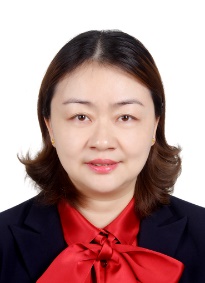of Pharmaceutical Science, Peking University Health Science Center, LecturerResearch AreasChemical BiologyBioinorganic Chemistry Education & Positions School of Pharmaceutical Science, Beijing Medical University ,B.S., 1995-1999.School of Pharmaceutical Science, Peking University Health Science Center, M.S., 2002-2005.School of Pharmaceutical Science, Peking University Health Science Center, Ph.D., 2013-2018.Department of Chemical Biology, School of Pharmaceutical Science, Peking University Health Science Center, Teaching Assistant, 1999-2004.Department of Chemical Biology, School of Pharmaceutical Science, Peking University Health Science Center, Lecturer, 2004-. Faculty AccoladesThe second prize of natural science award of Ministry of Education 2014. Research InterestsMajor areas of personal research in the field of chemical biology include bioinorganic chemistry and the estimation of ADME/T properties for candidate drugs.The main direction in the study of bioinorganic chemistry focuses on the anticancerous effect and the inner mechanism of vanadium compounds. It is found in my work that [VO(acac)2] discriminated between neuroblastoma cells and primary neurons with a 10-fold higher toxicity on the neuroblastoma cells than on normal neurons, which suggests potential application of vanadyl complexes for therapeutic treatment of neuroblastoma, and the inhibition effect of [VO(acac)2] on neuroblastoma cells was as effective as cisplatin through a special cyclin D-mediated and p53-independentapoptotic pathway,providing new insights for future discovery of new anticancer drugs overcoming the chemo-resistance due to p53 mutation.The evaluation of absorbtion, distribution, metabolism, elimination and toxicity (ADME/T) properties can contribute to screen out potential candidate drugs and provide guidance for subsequent study,design and development of drugs. Grants and fundingsPublications1. Yue Zhang, Lichao Wang, Kewu Zeng, Kui Wang, “Vanadyl complexes discriminate between neuroblastoma cells and primary neurons by inducing cell-specific apoptotic pathways”, Journal of Inorganic Biochemistry.2. Yaqiong Dong, Tessandra Stewart, Yue Zhang, Min Shi, Chang Tan, Xue Li, Lan Yuan, Aanchal Mehrota, Jing Zhang, Xiaoda Yang, “Anti-diabetic Vanadyl complexes reduced Alzheimer’s disease pathology independent of amyloid plaque deposition”, SCIENCE CHINA Life Sciences.3. Yaqiong Dong, Xia Niu, Ruyue Xiao, Yue Zhang, Qing Xia, Xiaoda Yang, “Pharmacological action and rational drug design of vanadium complexes”,Science China(Chemistry),2017, 47(2):162-171, revie4. Niu X, Xiao R, Wang N, Wang Z, Zhang Y, Xia Q, Yang X, “The Molecular Mechanisms and Rational Design of Anti-Diabetic Vanadium Compounds”, Current Topics in Medicinal Chemistry, 2016,16(8):811-22, review.5. Yue Zhang, Qing Xia, Xiaoda Yang, Kui Wang, “Metallostasis and metal-based drugs for Alzheimer’s disease”,Science China(Chemistry), 2014, 44(4): 541 - 554, revi
Zhang Yue
School of Pharmaceutical Science, Peking University Health Science Center, Lecturer
Research Areas
Chemical Biology
Bioinorganic Chemistry
Education & Positions
School of Pharmaceutical Science, Beijing Medical University ,B.S., 1995-1999.
School of Pharmaceutical Science, Peking University Health Science Center, M.S., 2002-2005.
School of Pharmaceutical Science, Peking University Health Science Center, Ph.D., 2013-2018.
Department of Chemical Biology, School of Pharmaceutical Science, Peking University Health Science Center, Teaching Assistant, 1999-2004.
Department of Chemical Biology, School of Pharmaceutical Science, Peking University Health Science Center, Lecturer, 2004-.
Faculty Accolades
The second prize of natural science award of Ministry of Education 2014.
Research Interests
Major areas of personal research in the field of chemical biology include bioinorganic chemistry and the estimation of ADME/T properties for candidate drugs.
The main direction in the study of bioinorganic chemistry focuses on the anticancerous effect and the inner mechanism of vanadium compounds. It is found in my work that [VO(acac)2] discriminated between neuroblastoma cells and primary neurons with a 10-fold higher toxicity on the neuroblastoma cells than on normal neurons, which suggests potential application of vanadyl complexes for therapeutic treatment of neuroblastoma, and the inhibition effect of [VO(acac)2] on neuroblastoma cells was as effective as cisplatin through a special cyclin D-mediated and p53-independentapoptotic pathway,providing new insights for future discovery of new anticancer drugs overcoming the chemo-resistance due to p53 mutation.
The evaluation of absorbtion, distribution, metabolism, elimination and toxicity (ADME/T) properties can contribute to screen out potential candidate drugs and provide guidance for subsequent study,design and development of drugs.
Grants and fundings
Publications
1. Yue Zhang, Lichao Wang, Kewu Zeng, Kui Wang, “Vanadyl complexes discriminate between neuroblastoma cells and primary neurons by inducing cell-specific apoptotic pathways”, Journal of Inorganic Biochemistry.
2. Yaqiong Dong, Tessandra Stewart, Yue Zhang, Min Shi, Chang Tan, Xue Li, Lan Yuan, Aanchal Mehrota, Jing Zhang, Xiaoda Yang, “Anti-diabetic Vanadyl complexes reduced Alzheimer’s disease pathology independent of amyloid plaque deposition”, SCIENCE CHINA Life Sciences.
3. Yaqiong Dong, Xia Niu, Ruyue Xiao, Yue Zhang, Qing Xia, Xiaoda Yang, “Pharmacological action and rational drug design of vanadium complexes”,Science China(Chemistry), 2017, 47(2):162-171, review.
4. Niu X, Xiao R, Wang N, Wang Z, Zhang Y, Xia Q, Yang X, “The Molecular Mechanisms and Rational Design of Anti-Diabetic Vanadium Compounds”, Current Topics in Medicinal Chemistry, 2016,16(8): 811-822, review.
5. Yue Zhang, Qing Xia, Xiaoda Yang, Kui Wang, “Metallostasis and metal-based drugs for Alzheimer’s disease”,Science China(Chemistry), 2014, 44(4): 541-554, review.
